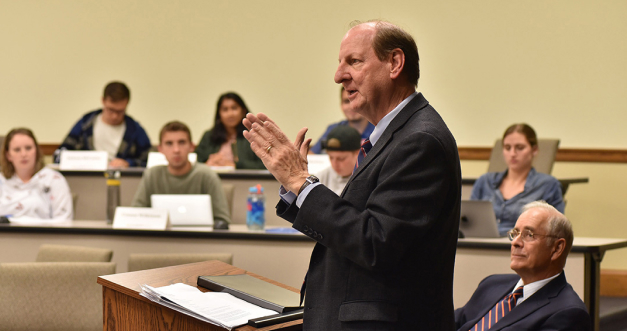
The Ford School's Rusty Hills has shone a light on the historic legacy of former President Gerald R. Ford, from the White House to the Ford School. In an opinion piece for the Detroit Free Press, Hills highlights lessons he learned from President Ford, beginning with his first political work on the Ford's 1976 presidential campaign. Hills calls attention to the core values President Ford exhibited in his career, which he references in his nearly 20 years of teaching: honesty, loyalty, respect, racial justice, healing, courage, and wisdom.
Hills spotlights Ford's handling of the "national nightmare of Watergate," when Ford told a torn nation, "Truth is the glue that holds government together... Honesty is always the best policy in the end." Hills asserts his hope for honesty to be restored as one of the core values in the White House. Hills asserts a lack of honesty present in the current administration. "According to the fact-checker at the Washington Post (whose owner, Jeff Bezos, is a donor to Trump’s Inauguration Fund), Trump made more than 30,000 false or misleading claims during his first four years in office, an average of more than twenty each day."
Discussing loyalty and respect as a key value to maintain in public policy, Hills mentions Ford's service in the U.S. Navy during World War II. Hills appreciates the perspective Ford shared after his service, underlining "the need to make alliances and work closely with the countries that had fought alongside the U.S. In Ford’s view, the U.S. was both stronger and safer because of these partnerships." Encouraging standing with our allies is important for Hills as he teaches students at the Ford School.
Hills also pointed to Gerald Ford's support for affirmative action at the University of Michigan as a necessity for combating racial injustices. Arguing that Ford's opinion of DEI efforts and inclusivity is starkly different from President Trump, Hills notes that Trump "has issued several executive orders to eliminate diversity, equity and inclusion programs within the federal government, which Trump labels as discriminatory and counterproductive." Hills asserts that he teaches his students to "support racial justice, inclusion, diversity and affirmative action, like Gerald Ford, and not oppose efforts to balance the scales of justice, like Donald Trump."
Furthermore, Hills advocates for movement toward a less-polarized political climate, inspired by Ford. Ford worked on the American Agenda with his successor, Jimmy Carter, to "promote the healing of political divisions."
"Gerald Ford was awarded the John F. Kennedy Profile in Courage Award for his decision to pardon former President Richard Nixon." Through this act, Hills praises Ford's willingness to "risk his chances of election in order to put the needs of the country first." Whereas he claims President Trump showed a lack of courage to act on January 6th, and failed to denounce the violent mob storming the U.S. Capitol.
Concluding the article, Hills suggests the greatest lesson that can be learned from Gerald Ford's legacy was his commitment to live by a prayer, written by John Adams, stating, "‘May none but honest and wise men ever rule under this [White House] roof.'"
Read the full article here.
